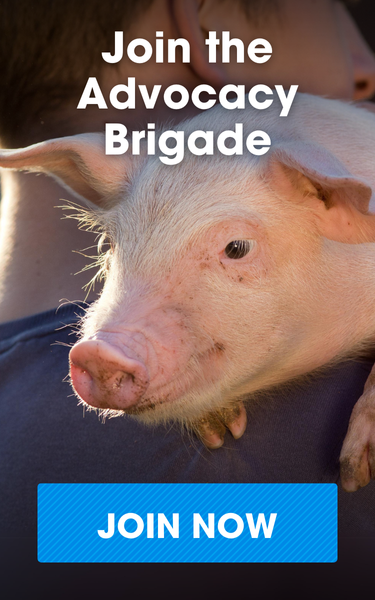
A Farm Tour Worth a Thousand Words: ASPCA Connects Lawmakers and Farmers to Inspire Better Policies

Every year, billions of pigs, chickens and cows suffer in the cruel factory farming system. Thousands of independent, pasture-based farmers across the country are demonstrating that these industrial practices are inhumane and unnecessary. The ASPCA is proudly working alongside these farmers and ranchers to advocate for a food system that better aligns with Americans’ values and compassion for animals. Last week, we brought Washington, D.C., policymakers from both political parties to two farms to demonstrate the benefits and challenges of higher welfare farming practices. We also held a congressional briefing, bringing farmers to Capitol Hill to discuss how policy change can support a more humane, healthy food system.
Farm Tours
If a picture is worth 1,000 words, first-hand experience speaks volumes. Our first stop was Kinloch Farm in The Plains, Va., a 3,000-acre pasture-based, certified Animal Welfare Approved beef cattle operation. There, the group watched cows eat varied native grasses and listened as the Farm and Conservation Manager, Mike Peterson, explained how stressful the animals’ lives would be on a barren feedlot, which is where most beef is produced in the U.S.

The tour also visited Whiffletree Farm in Warrenton, Va., where Jesse Straight and his family raise broiler chickens, laying hens, turkeys and pigs and sell products at their farm store and throughout the D.C. metro area. Policy makers held baby chicks who would shortly be moving to pasture and offered piglets back scratches as they roamed and rooted freely in the woods — behaviors they would never be able to exhibit in a crowded, cement-floored industrial farm.

In addition to meeting the Virginia farmers, Congressional staff were accompanied on the tour by farmers and advocates from across the country, as well as ASPCA farm animal welfare experts. Farmers and representatives from organizations like the Socially Responsible Agriculture Project, Farm Aid, Food Animal Concerns Trust and Food and Water Watch all discussed how destructive industrial agriculture is compared to higher welfare practices — not just for animals but for the communities nearby, the environment and the people who grow our food.
Congressional Briefing
The ASPCA brought the important message of investing in more humane, healthy farm systems to a Congressional briefing on Capitol Hill the day after the farm tour. The panel was moderated by the ASPCA and featured farmers and farm advocates who attended the previous day’s tour.
The panel explained that federal policies, including those authorized through the Farm Bill and programs run by agencies like the U.S. Department of Agriculture, have long incentivized and deeply entrenched the cruel industrial agriculture system that produces more than 95% of Americans’ meat, eggs and dairy. These systemic advantages and subsidies make it especially challenging for independent, higher welfare farmers to compete in the marketplace. Unlike harmful factory farms, higher-welfare, pasture-based farms benefit farm animals, provide farmers with financial stability and keep rural communities healthy. It’s critical that our public policy supports these systems.

Panelists pictured from left to right: Andrew L. Smith, Sr., Craig Watts, Diane Christofore, Jesse Straight, Daisy Freund
The conversation spanned from bird flu to disaster relief and attacks on state farm animal protection laws, but the take-home message was clear: Even relatively small investments in more humane, pasture-based farming would be a game-changer for our food and farm system.
“This is not about quality of life. This is about getting that bird as fat as it can, as cheap as they can, as quick as they can. It is an absolute race to the bottom,” said Craig Watts, director of the Socially Responsible Agriculture Project’s Contract Grower Transition Project.
“The fundamental issue is the life these birds are given to live sets them up for failure. Our farming practice and philosophy is we do everything we can to give these birds the life they were meant to live, which then helps them thrive,” said Jesse Straight, owner of Whiffletree Farm. “This year it’s bird flu, and five years from now it’ll be something else because we’re in these confined animal feeding operations. In my mind, bird flu is nature waving a flag and saying, ‘Hey everyone, this isn’t a good way to do it.’”
“Part of the reason why food is so cheap ... is because we are shifting the cost outside of the price, and ultimately taxpayers are paying it,” said Daisy Freund, vice president of farm animal welfare at the ASPCA. “Whether it’s through these cruel depopulation methods, cleaning up our environment, public health consequences of raising animals in this way, we are footing the bill one way or another.”
Panelists urged support for important bills that would create more opportunities for farmers already raising animals in higher-welfare systems and those trying to get out of the factory farm system, including:
- The Industrial Agriculture Conversion Act, which would fund farmers’ transitions away from factory farming and into pasture-based farming or crop production.
- The Industrial Agriculture Accountability Act, which would hold industrial agriculture accountable for disaster planning and mitigation, including limiting the use of the most inhumane depopulation methods.
- The EQIP Improvement Act, which would ensure more conservation funding supports independent higher-welfare farmers, rather than propping up factory farm infrastructure like manure lagoons.
Additionally, panelists warned about the danger of misleading bills like the EATS Act, which would eliminate important markets for higher-welfare farmers and negatively impact the lives of millions of farm animals.
You can help higher-welfare farms across the country thrive! Join our Factory Farming Task Force to ensure you’re up to date on critical actions that help farm animals and build a more humane food system.

